The Traveling Pitcher Salesman
Abdullah Noorzai is an elderly pitcher salesman who takes care of his large family by walking several kilometers every day, striving to turn a profit and feed the mouths waiting at home.

Written by Samira Wafa and edited by Abdul Ahad Poya
ZARANJ, NIMROZ — Abdullah Noorzai is a traveling salesman from Nimroz who sells pitchers. Despite his age and physical weakness, he exerts great effort care for his family of 17. Every day, he carries a stack of colorful pitchers on his back as he traverses the alleys of Zaranj City, striving to turn a profit and make ends meet.
In many parts of the world, toilet paper is considered unclean, instead, other cultures use water to clean themselves. In communities without running water like Afghanistan, pitchers are set next to the toilet to provide necessary water. Although his own life may lack color, he perseveres to provide for those he loves.
In this episode of One Day in Afghanistan, Samira Wafa documents a day in the life of 62 year-old pitcher salesman Abdullah, following him through the alleys of Zaranj City, the capital of Afghanistan’s southwestern Nimroz province. Abdullah married when he was 18 and his wife was just 15. The couple has 11 children and four grandchildren.
At 8am I head towards Abdullah's house in the Mohajer Abad neighborhood of Zaranj City. I search for over an hour until I finally find Abdullah's home with the help of the area's residents.
Mr. Noorzai, a tall man with a white beard, dark green eyes, and dressed in black, greets me at the metallic red metal door marking the entrance to his home. On a typical day he should already be selling pitchers at this hour, but today he is repairing his home's roof with his oldest son, Ahmad.
At 9 am, Mr. Noorzai gathers his collection of red, white, green, and striped pitchers, loads them onto his back, and exits his home, walking at a slow pace. After already working for three hours, he is visibly tired. The morning breeze wafts through the streets, caressing my senses and invigorating me, but does little to remove the tired look on Abdullah's face.
Mr. Noorzai and his family immigrated to Iran 34 years ago due to the war and a lack of employment opportunities.
“The wars took everything from us, there was no work, and we had no choice but to immigrate to Iran. Life was good and affordable there,” Abdullah tells Alive in Afghanistan.
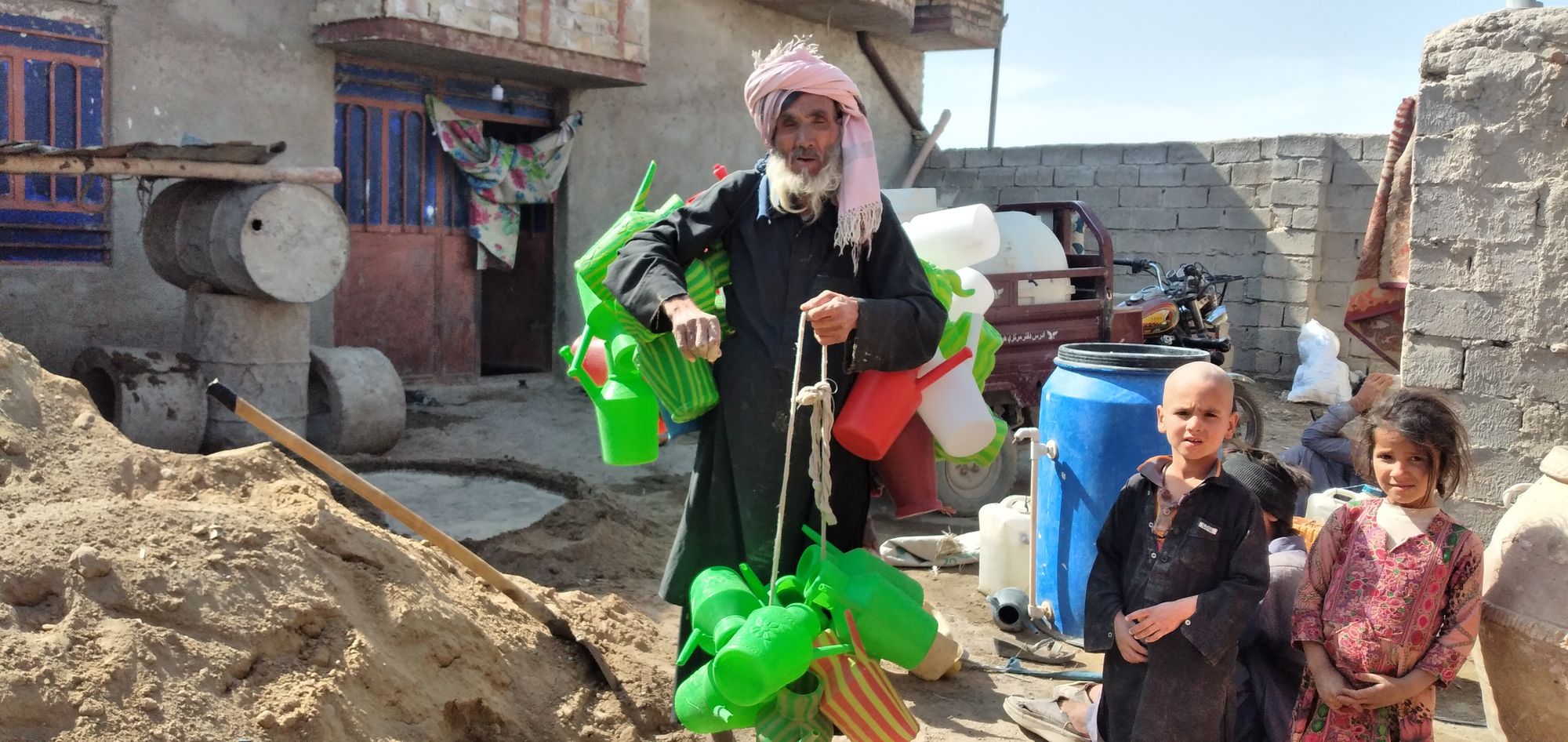
For 25 years, he worked as a laborer until the police deported him and his family back to Afghanistan. It has now been 18 years since returning to their home country. During this time, Mr. Noorzai has worked as a traveling pitcher seller.
Walking all day long and the monotony of his work drain Mr. Noorzai's body and soul. Despite this, his love for his family prevents him from settling down, and he continues to walk many kilometers each day to sell a few pitchers and turn a profit.
He now works tirelessly to keep his family from starvation and certain death.
“My daily income is around 70,000 [Iranian] Toman, about 130 Afghanis ($1.50 at current exchange rates. I can’t even [afford to] buy a bag of flour with it,” Abdullah says.
It is currently 11 in the morning, and the red, white, green, and striped pitchers on Abdullah's back are the only vibrant colors in the otherwise gray monochrome of sandy streets, cement blocks, and mud walls. His oldest son, a laborer, does not make enough to take care of their large family, so Abdullah helps despite his old age and a hunched-back.
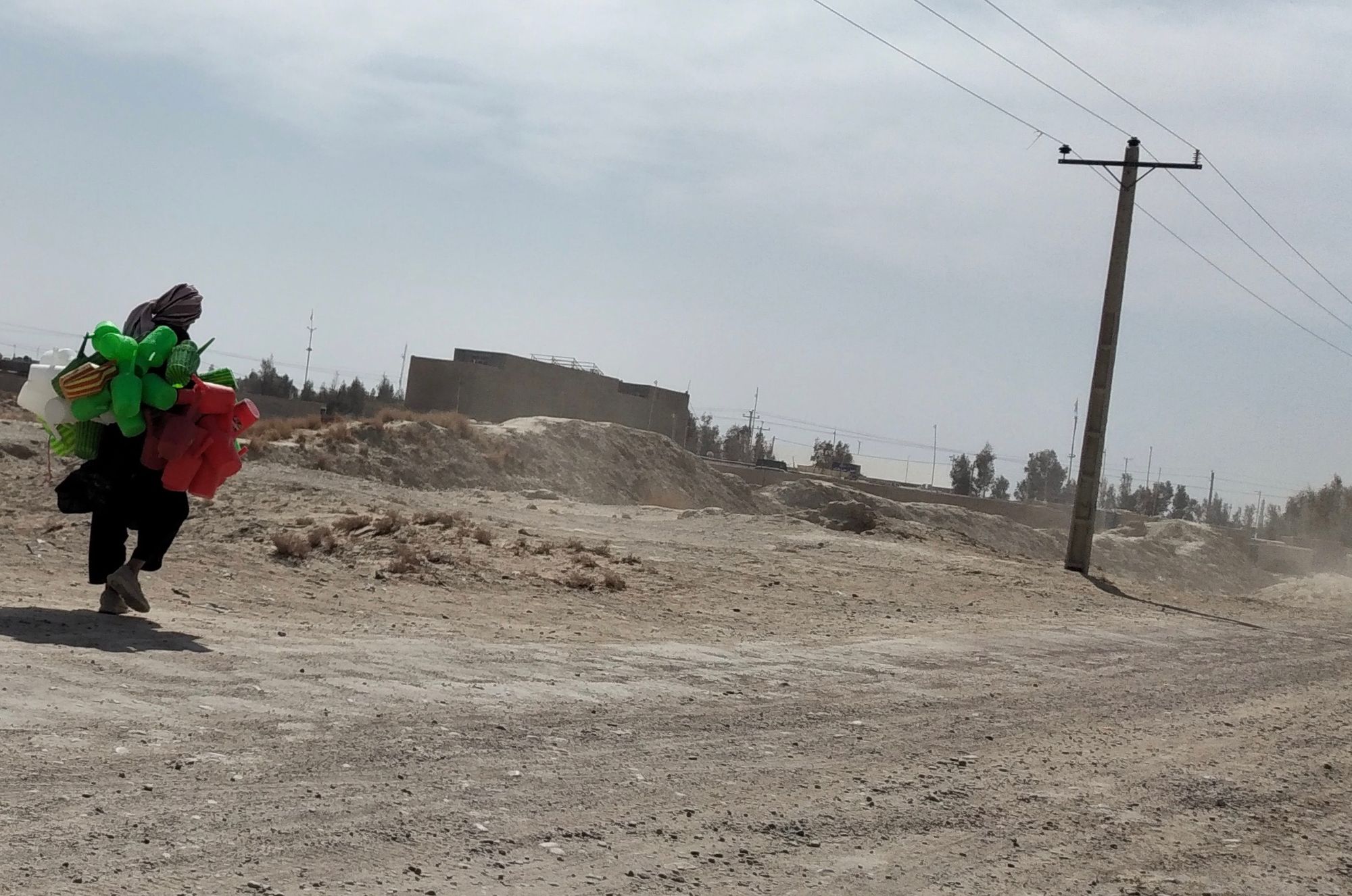
Abdullah wanders through dusty streets the only sound as he looks for potential customers is the squeal of sand beneath his shoes. Every two hours he takes a break for 20 to 25-minutes, trying to find shade as the desert sun beats down overhead.
“Living in Afghanistan is extremely difficult. With my minimal income, sometimes I can’t buy potatoes and onions. I don’t rest for days and get leg pains from walking so much. My children are unemployed and I can’t afford to send them to school; I am distressed out of poverty and misery. Sometimes, problems become so unbearable that my wife bursts into tears,” Abdullah says, trying to shade his eyes from the sun overhead sun.
His hands are full of blisters, and his face is lined with wrinkles, marks left by hard work and the difficult life he leads. Abdullah says he has not had a single good day since returning from Iran 18 years ago.
"We pay 2,500 Afghanis ($28.90) a month in rent. We buy a bag of flour with the leftovers and buy groceries on loan. Sometimes store owners refuse to give us groceries on loan or come knocking on our door to collect their debt, at which point I have to beg my relatives to lend me some money,” Abdullah says.
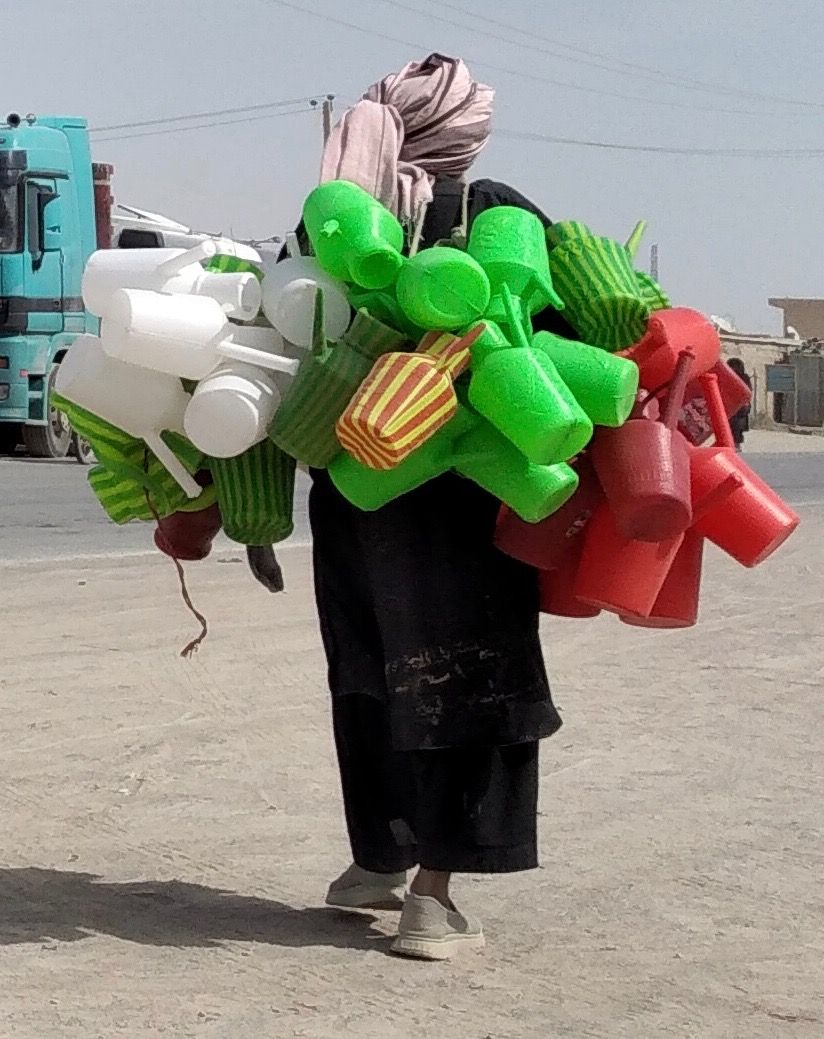
Abdullah walks through several neighborhoods in Zaranj, including Naqsha, Sia Chashman, and Maidan Maldaran before returning home exhausted and famished. He usually starts work at 7 am and returns home at 6 pm but doesn't make enough to buy lunch outside. His hunger makes the daily trek ten times harder, sapping the strength from his legs.
“I walk constantly, stopping only when I am asked ‘Do you have a pitcher?’, I shy away from asking people for food but do ask for water sometimes,” Abdullah says as he continues walking through one of Zaranj City’s neighborhoods, with me in tow.
Stopping for another break under the shade of a tree, Mr. Noorzai shows me three different types of pitchers, priced based on their quality and size. The white ones, he says, are the best. They are produced in the province of Herat just north of Nimroz and are priced at 60 Afghanis each ($0.69). The pitchers made in Kabul are the second best and sold for 10 Afghanis less.
Abdullah explains that Herat produces higher quality and more durable pitchers, which have a higher market demand. The pitchers made in Kabul are cheaper and less durable. Abdullah cannot afford to buy in bulk from other provinces, which reduces the amount of profit he could make. Because of this, Abdullah makes only 10 Afghanis or about $0.11 on each pitcher he sells.
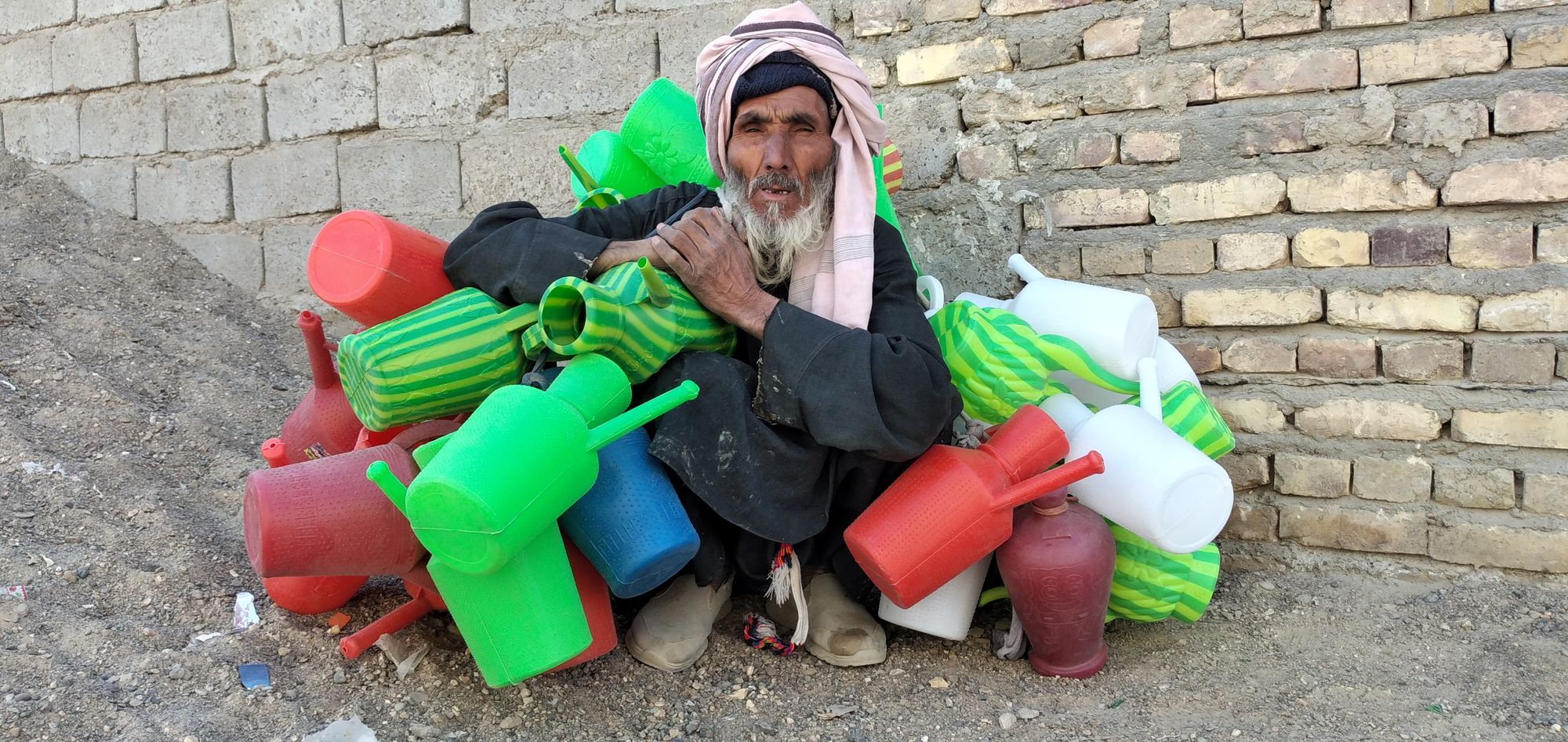
It is now 1 pm, and Abdullah changes direction. A customer named Salim stops Abdullah moments after he changed direction toward Zaranj Customs. Abdullah takes the pile of pitchers down from his shoulder and puts it on the ground.
“How much are the pitchers?” Salim asks Abdullah.
Patiently, Abdullah prices the different types of pitchers. Eventually, Salim buys three pitchers. As Salim walks off, Abdullah takes another break, using the corner of a wall for shade.
I leave the man to his business and head to a local restaurant to grab some lunch. At 2 pm I find Abdullah, in one of the alleys nearby where we had parted ways earlier.
Abdullah married off two of his daughters at the ages of 13 and 15. The girls never set foot in a school. Until they moved to their husbands’ homes, they had never stepped outside the walls surrounding their home. According to Abdullah, once girls reach adulthood, they are to be wedded. Many Muslims believe adulthood begins, latest, at 15.
“My daughters are illiterate because I myself am illiterate. I didn’t know the value of education. But a son and four grandchildren go to a madrassa [religious school] nearby,” Abdullah says.
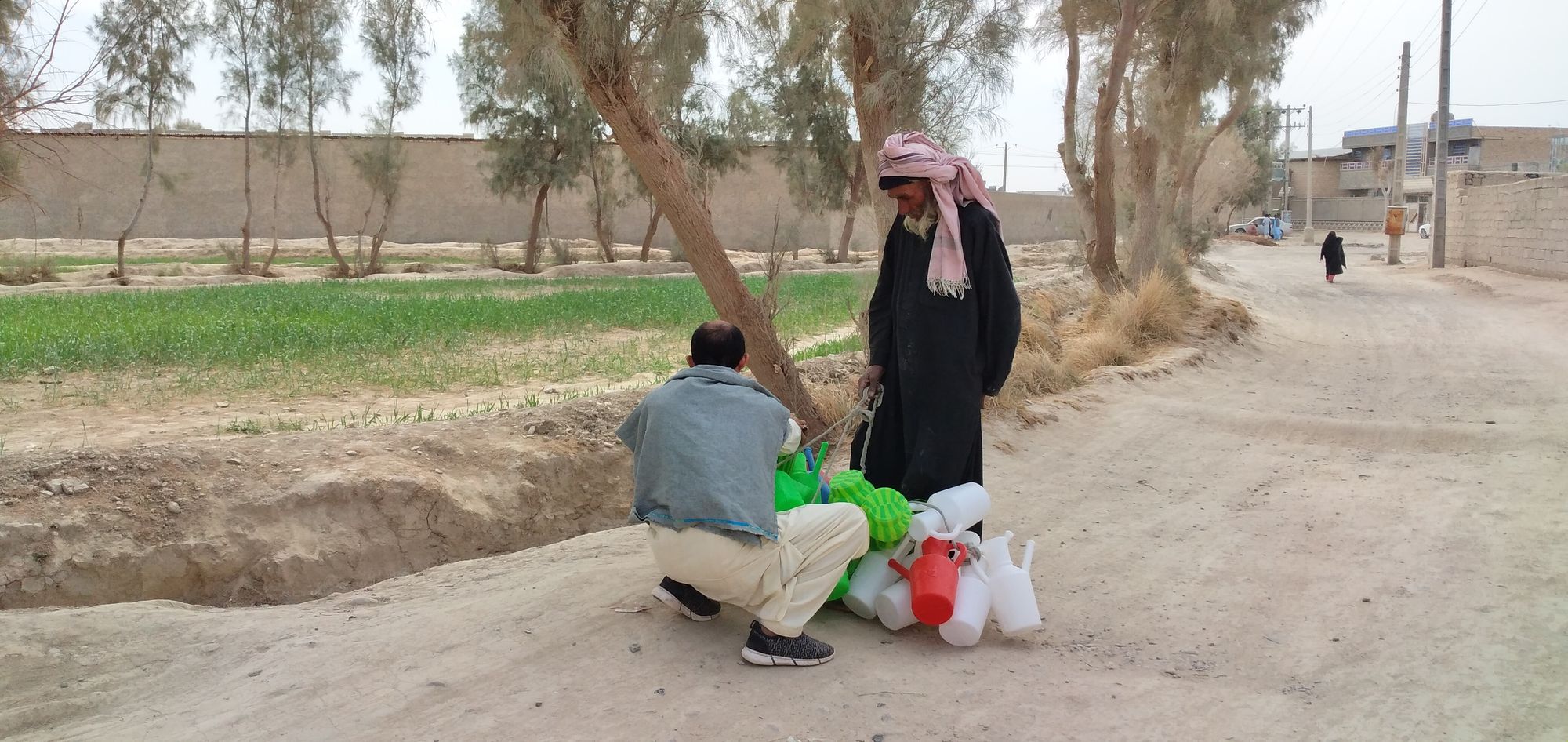
It’s now 3 pm and we arrive at Abdul Samad village. So far, we have traveled 15 kilometers, him all by foot. Sometimes I have been on foot, while other times following him in my car.
“Kaka [uncle], Kaka, sabr [wait]!” Abdul Rahman, the potential customer, calls out to Abdullah. Calling him uncle is an expression of respect for the elderly.
Abdullah puts down the pile of pitchers from his shoulder, happy that another potential customer has stopped by.
“Kaka, how much for the pitchers? Are they all sold at the same price or is it different?” Rahman asks Abdullah.
“These are 60 Afghanis,” Abdullah tells Rahman pointing to the white pitchers.
“The red ones are 50 Afghanis,” Abdullah continues.
After some bargaining, Rahman buys two pitchers from Abdullah for 60 and 45 Afghanis respectively, 5 Afghanis lower than the initial asking price. Abdullah ties the pitchers together with cotton rope and hoists them onto his back to continue walking through the sandy streets.
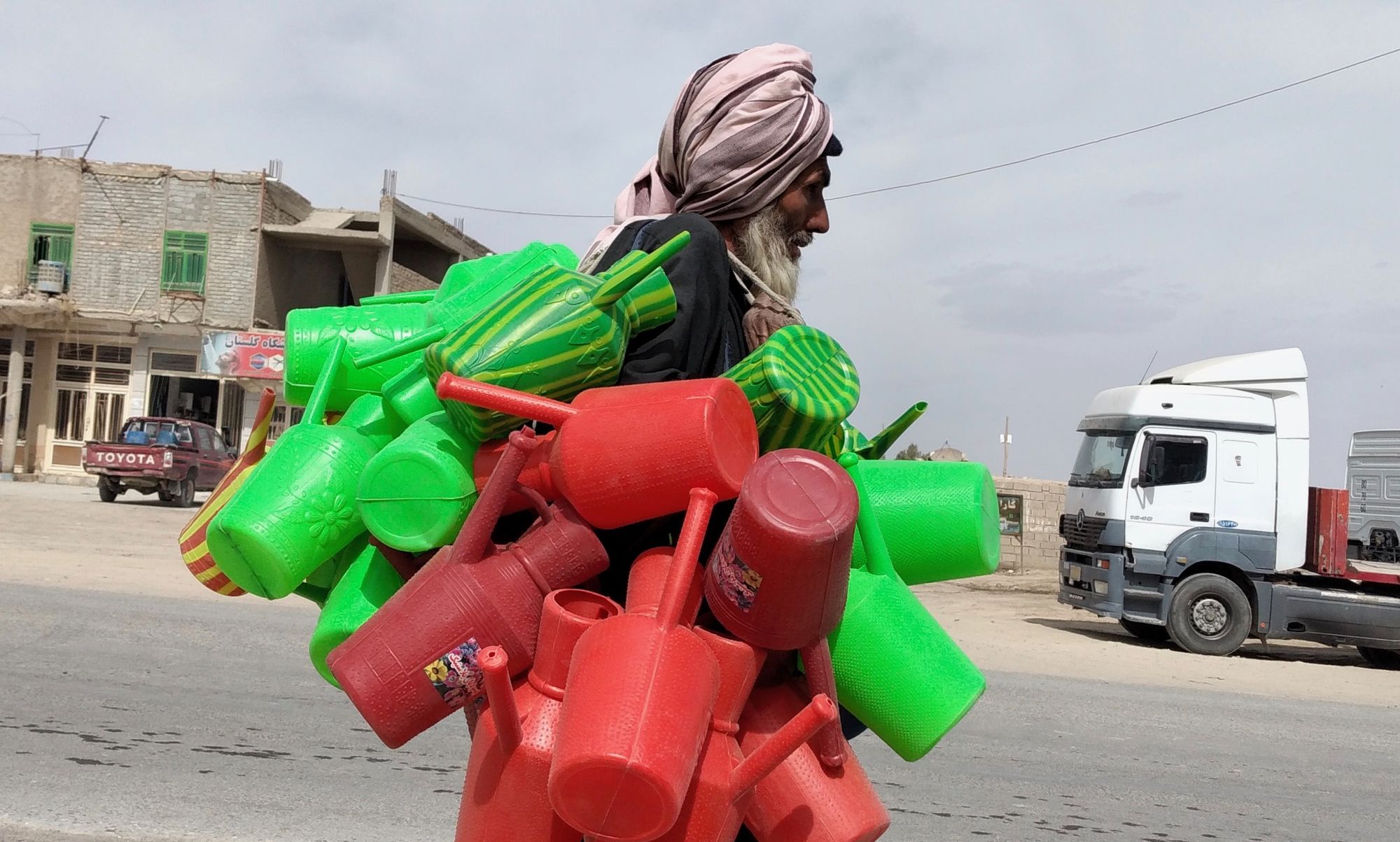
Throughout the entire day, Abdullah only manages to sell seven pitchers, earning a meager 65 Afghanis ($0.65 USD), not even enough to buy a meal. His son Ahmad, who usually makes between 200 to 300 Afghanis ($2.31 to $3.46) a day from labor, has been working on their roof to help support the family.
Abdullah would become a shepherd and raise livestock if he had the means to do so, citing a lack of options for illiterate individuals like himself. However, this sentiment contradicts the current employment climate in Afghanistan, where many highly educated individuals also struggle to find work.
Afghanistan currently faces an unemployment crisis worse than any in the past twenty years and many people are unable to afford basic necessities like food and shelter. Thousands of men in Abdullah’s age beg due to extreme poverty, but he hasn’t given up and continues to work.
Abdullah reflects on his time living in Iran, recalling it as the golden era and the happiest time of his life.
“When we were living in Iran, my family was smaller, I was young and strong, and had a decent income. But the Iranian Government forcibly deported us, and I am now miserable here,” Abdullah says.
